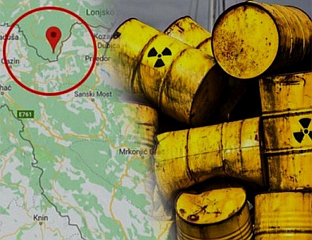English
02.11.2025

REPUBLIKA SRPSKA AFFIRMING DAYTON AGREEMENT THROUGH FOUR PILLARS AND THREE PRINCIPLES

BANJA LUKA, NOVEMBER 2 /SRNA/ - The peace negotiations in Dayton are one of the historic moments that once again demonstrated the political maturity of the Serb people, emphasized Professor of Constitutional Law Siniša Karan.
Commenting on the anniversary of the start of the negotiations on BiH in Dayton, Karan told SRNA that this was a time when political will and statesmanlike wisdom were transformed into the Dayton Agreement, which brought peace, stability, and a clear constitutional order. “Republika Srpska and Dayton Agreement-based BiH rest on four pillars: the will of the people, international verification, economic independence, and the strength of institutions, as well as on three principles of a functional federal state: parity, consensus, and the division of competences,” Karan emphasized. He said that the first of the four pillars is the will of the people, reminding that Republika Srpska was created as an expression of the people’s genuine will, and that the democratic legitimacy of its institutions is its strongest shield. “The second pillar is international verification. The Dayton Peace Agreement is a treaty and part of international law, which makes the status of Republika Srpska a part of the international legal order. This represents its legal and political security. Economic independence is the third pillar of Republika Srpska. There can be no institutional sovereignty without an independent economy. Therefore, economic development is the most tangible form of preserving the Dayton Agreement,” the constitutional law professor explained. According to him, the fourth pillar is the strength of institutions, as they are the solid pillars of the constitutional order. “The Constitution of Republika Srpska and the Constitution of BiH, which are harmonized, and the institutions, are not abstract concepts. They are living mechanisms that protect the constitutional order and guarantee the survival and stability of the state,” Karan said. Three principles of a functional federal state, he added, are: parity - equality of the entities and peoples in BiH’s joint institutions and decision-making; consensus - a mechanism protecting the constitutionality, meaning no decisions can be made without agreement; and division of competences - powers that are clearly defined and inalienable without the consent of the entities. “The division of competences, and the presumption of powers in favor of the entities, demonstrate that BiH is actually an asymmetric federation with elements of a confederation, given that one entity is organized as a unitary state and the other as a federal one,” Karan said. He reminded that the Dayton Agreement was signed the moment the warring parties agreed to a compromise, with each of the three sides achieving at least a minimum of their demands. “The peace agreement established an asymmetric, confederal-federal complex state, with highly autonomous, ethnicity-based entities and central institutions possessing limited, yet sufficient, international-legal capacity. Thus, BiH is composed of two state-building units. It was accepted by all three peoples and verified by the international community,” Karan emphasized. According to him, the Dayton Agreement fully satisfied no one, but everyone agreed to it because it met the minimum demands of all three sides. “Republika Srpska achieved the minimum of its objectives within the complexity of the newly formed state, where it gained ethnic-territorial representation, the constituent status of its people, and equality as an entity — an entity that is slightly less than a state, yet far more than mere territorial autonomy,” Karan said. He pointed out that the claim that the Dayton Constitution is the reason for the failure of the state is merely a mask, behind which primarily hides the policy of the Bosniak political elite seeking absolute domination and appropriation of BiH, attempting to “resolve” the position of Serbs in BiH through the negation of the Dayton Agreement. He noted that Republika Srpska, since the very signing of the agreement, has consistently defended the Dayton Agreement and its constitutional position, equality and democratic order, as well as its historical and state-building continuity. “Relentlessly, institutionally, and in accordance with constitutional and legal principles, Republika Srpska is waging a battle to preserve the original Dayton Agreement. This struggle is not mere political rhetoric or a reaction to current political challenges, but a thirty-year substantive legal and constitutional resistance to attempts at unitarization,” Karan explained. He emphasized that defending the Dayton Peace Agreement and its annexes does not represent a defense of the past, but rather the protection of the foundations of a functional, stable, and legally organized BiH. “It is precisely the four pillars and three principles that form the foundation of stability for Republika Srpska and BiH, and they are not, as unitarists claim, obstacles to development. Therefore, four plus three is the formula for the survival of Dayton Agreement-based BiH,” concluded Professor of Constitutional Law Siniša Karan.
English


KOJIĆ: MAGAZINOVIĆ IS MISLEADING PUBLIC
ISTOČNO SARAJEVO, DECEMBER 21 /SRNA/ – SNSD MP in the House of Representatives of theBiH Parliamentary Assembly Milorad Kojić says that Chair of the S...


VUJIČIĆ: BOSNIAK MINISTERS HAVE BEEN BLOCKING ISSUE RESOLUTION FOR YEARS
ISTOČNO SARAJEVO, DECEMBER 21 /SRNA/ – Bosniak ministers have been blocking for years the resolution of the issue of nuclear waste disposal along the...


KOŠARAC: GENTLEMEN, GET SERIOUS AND STOP “BEATING A DEAD HORSE”
SARAJEVO, December 21 /SRNA/ – Council of Ministers Deputy Chair Staša Košarac stresses that a number of FBiH politicians holding important positions...


GALIĆ: BiH HAS BEEN HOLDING CROATIA BACK FOR YEARS IN TRGOVSKA GORA PROJECT
ISTOČNO SARAJEVO, DECEMBER 21 /SRNA/ – Croatia has been held back for five to six years in its attempts to initiate key steps in the construction of a...


SERB ARRESTED IN NORTH KOSOVO
BELGRADE, DECEMBER 21 /SRNA/ – Serb Vidosav M. was arrested in his home in Lešak in Kosovo and Metohija by Albin Kurti’s phalanxes as part of the viol...


INTENSIFY PENALTIES FOR CAUSING TRAFFIC ACCIDENTS DUE TO SPEEDING AND ALCOHOL CONSUMPTION
BANJA LUKA, DECEMBER 21 /SRNA/ – The increase in traffic-related death rate in Republika Srpska should alarm and prompt the urgent intensification of...





 LATEST NEWS:
LATEST NEWS: